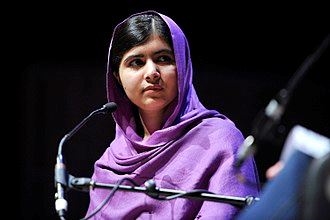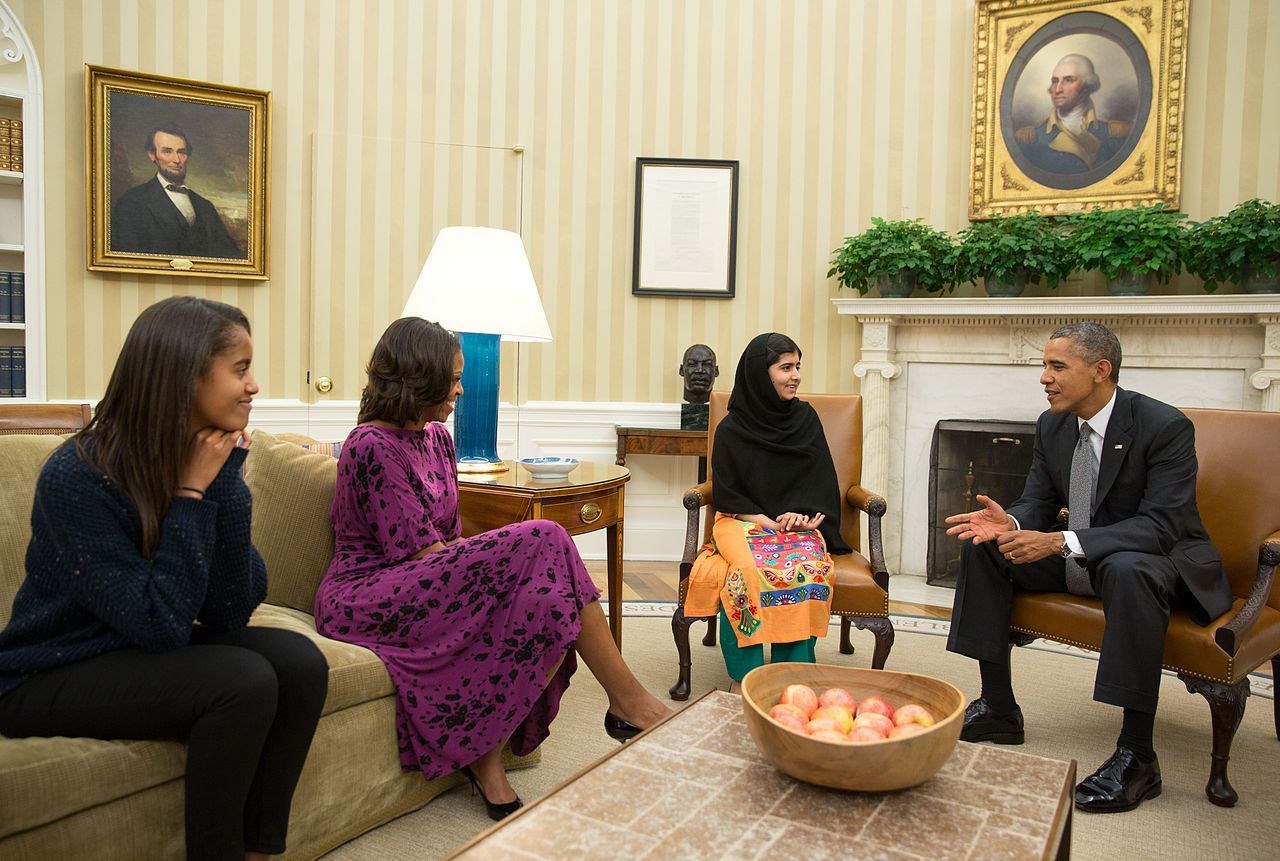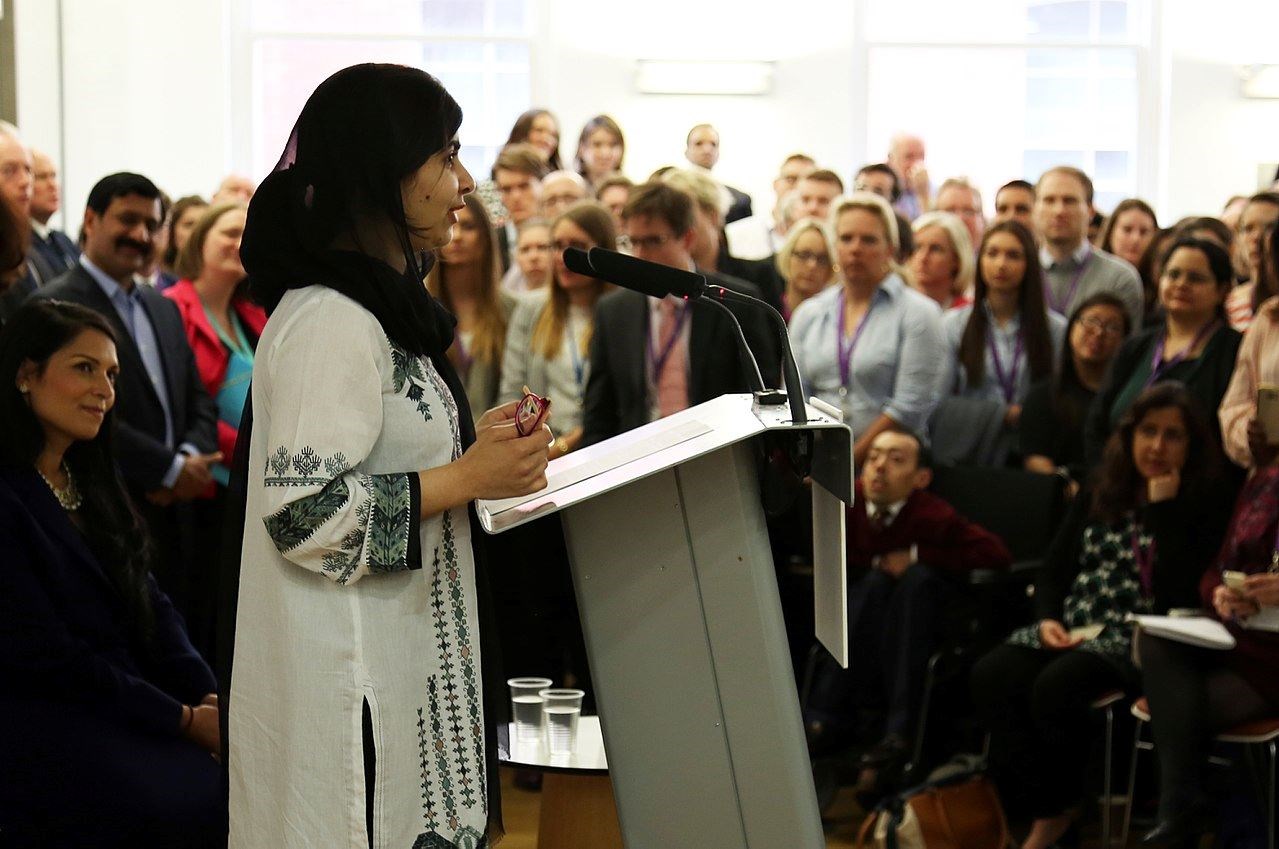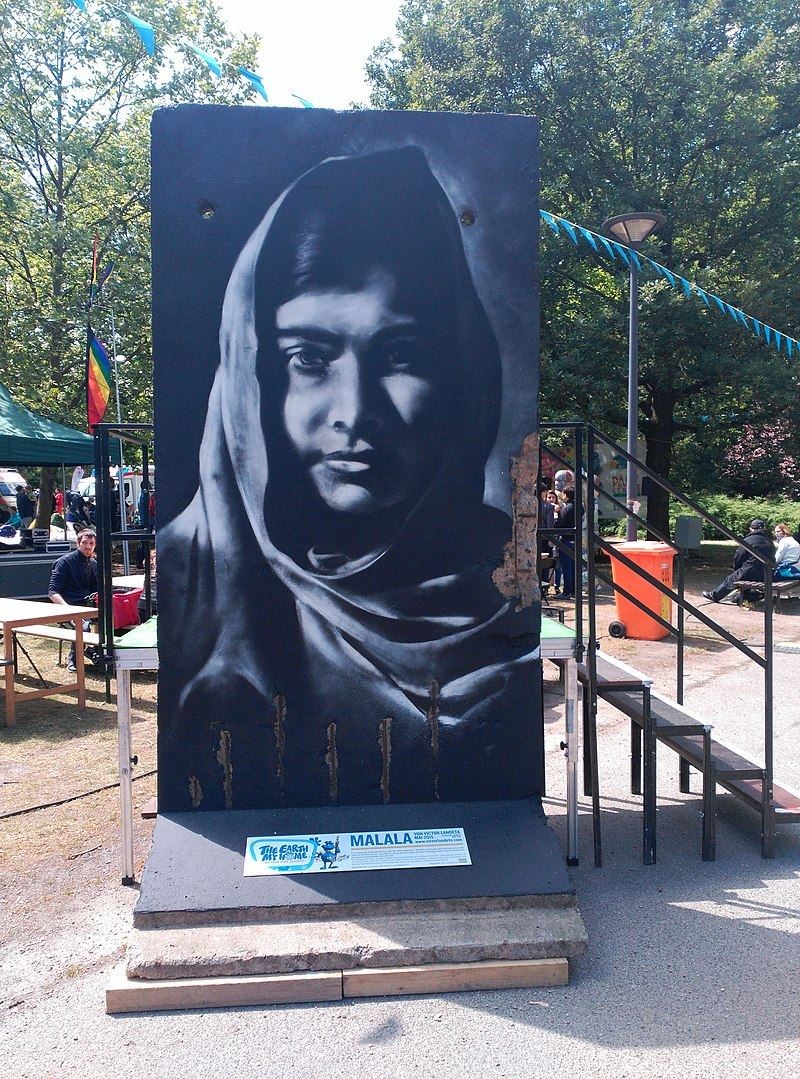 Malala Yousafzai at the 2014 Women of the World FestivalWikipedia “A hero is no braver than an ordinary man, but he is brave five minutes longer” (Emerson). As explained by Claire Warner’s, “Why We Love Superheroes, According to Psychology” (2017), heroes are those who intervene when a problem arises. Warner expresses how our love for heroes begins early in childhood due to the desire we have for justice and equality. From your computer screen to ordinary everyday life, heroes exist all around us. With values such as bravery, nobility, and the ability to overcome adversity, heroes do their best to help others. Heroes fight for their beliefs no matter the circumstances, staying brave in the face of danger. Heroes are noble. Their high moral values and peaceful approaches set them apart from others. Heroes endure what others will not, doing what is right over what is easy. Though there may be other ways to view heroism, these values are the difference between heroes and ordinary people.
Malala Yousafzai at the 2014 Women of the World FestivalWikipedia “A hero is no braver than an ordinary man, but he is brave five minutes longer” (Emerson). As explained by Claire Warner’s, “Why We Love Superheroes, According to Psychology” (2017), heroes are those who intervene when a problem arises. Warner expresses how our love for heroes begins early in childhood due to the desire we have for justice and equality. From your computer screen to ordinary everyday life, heroes exist all around us. With values such as bravery, nobility, and the ability to overcome adversity, heroes do their best to help others. Heroes fight for their beliefs no matter the circumstances, staying brave in the face of danger. Heroes are noble. Their high moral values and peaceful approaches set them apart from others. Heroes endure what others will not, doing what is right over what is easy. Though there may be other ways to view heroism, these values are the difference between heroes and ordinary people.
Malala Yousafzai, the survivor of a terrorist attack and an avid advocate for education, is this kind of hero. Born in Mingora, Pakistan, Malala constantly struggled against the persecution from the Taliban, a terrorist group that had begun to take root in her hometown and imposed strict Islamic laws. As the influence of the Taliban grew, Malala’s rights deteriorated. She lost the privilege to attend school because of her gender. As an eager student, Malala was completely against this type of ideology since she firmly believed in the importance of a good education. To Malala, education opens up people’s eyes to new ideas, creating acceptance of diversity of thinking. Though she was fearful, Malala fought back against the Taliban by continuing to go to school and using media to bring awareness of the gender inequality in Pakistan. She appeared on countless talk shows and interviews. Eventually, her voice was heard, but these exposures angered the Taliban. At only age 15, Malala was shot in the head on the way home from school. Fortunately, she made a full recovery. While a tragic event like this would scare others away and bring hatred towards the Taliban, Malala stayed relentless in her pursuit and maintained an amicable composure towards those who harmed her. Malala displays her nobility through her high moral character and pacifistic ways. She does not let her emotions get the best of her and makes her cause the main priority. By overcoming the violence of the Taliban and continuing to use her voice to help others, Malala Yousafzai demonstrates her ability to stay peaceful and noble as well as stand tall in the face of danger.
 Malala with the ObamasWikimedia CommonsMalala’s approach towards the Taliban unveils her sense of nobleness through her peaceful composure and good will towards the terrorists. In Malala’s United Nations speech, she expressed that she did not hold any sort of grudge against the Taliban: “Dear sisters and brothers, I am not against anyone. Neither am I here to speak in terms of personal revenge against the Taliban or any other terrorist group. I am here to speak up for the right of education of every child. I want education for the sons and the daughters of all the extremists especially the Taliban” (Yousafzai 2013). Malala explains that she was not there for her own cause, but instead, represents all children who are deprived of education. In fact, Malala wants Talib kids to receive a good education so that they can break the cycle of terrorism. Her noble ways shield her emotions from getting in the way of her goal of advancing accessible education. Malala displays the traits of a true hero by putting her cause in front of everything else. Her cause goes beyond helping Pakistan. Her influence also transcends to kids in places like Nigeria, Afghanistan, and India. Malala’s high moral values like her selflessness and good will demonstrate her nobility. In Yousafzai’s 2013 autobiography, Malala expressed what she would do if she was attacked: “On the trip back home, though, I asked myself what I would do if a Talib came to kill me. Well, I would just take my shoe and hit him. But then I thought: If you hit a Talib with your shoe, there is no difference between him and you. You must not treat others with cruelty. You must fight them with peace and dialogue” (Yousafzai 114). Malala’s statement that she must fight others with peace and dialogue shows that she would do what is right even though she knows it is not an easy option. Even when her first instinct is to fight back, she decides not to because it would make her no different than the terrorist. Malala’s pacifistic ways set her apart from others as most people would fight back if they were attacked. By fighting back with peace, Malala sets an example for others to stay merciful when facing enemies. Though Malala is seen in both a high point and a low point in her life, her beliefs and values remain the same. She stays noble throughout all the adversities she faced.
Malala with the ObamasWikimedia CommonsMalala’s approach towards the Taliban unveils her sense of nobleness through her peaceful composure and good will towards the terrorists. In Malala’s United Nations speech, she expressed that she did not hold any sort of grudge against the Taliban: “Dear sisters and brothers, I am not against anyone. Neither am I here to speak in terms of personal revenge against the Taliban or any other terrorist group. I am here to speak up for the right of education of every child. I want education for the sons and the daughters of all the extremists especially the Taliban” (Yousafzai 2013). Malala explains that she was not there for her own cause, but instead, represents all children who are deprived of education. In fact, Malala wants Talib kids to receive a good education so that they can break the cycle of terrorism. Her noble ways shield her emotions from getting in the way of her goal of advancing accessible education. Malala displays the traits of a true hero by putting her cause in front of everything else. Her cause goes beyond helping Pakistan. Her influence also transcends to kids in places like Nigeria, Afghanistan, and India. Malala’s high moral values like her selflessness and good will demonstrate her nobility. In Yousafzai’s 2013 autobiography, Malala expressed what she would do if she was attacked: “On the trip back home, though, I asked myself what I would do if a Talib came to kill me. Well, I would just take my shoe and hit him. But then I thought: If you hit a Talib with your shoe, there is no difference between him and you. You must not treat others with cruelty. You must fight them with peace and dialogue” (Yousafzai 114). Malala’s statement that she must fight others with peace and dialogue shows that she would do what is right even though she knows it is not an easy option. Even when her first instinct is to fight back, she decides not to because it would make her no different than the terrorist. Malala’s pacifistic ways set her apart from others as most people would fight back if they were attacked. By fighting back with peace, Malala sets an example for others to stay merciful when facing enemies. Though Malala is seen in both a high point and a low point in her life, her beliefs and values remain the same. She stays noble throughout all the adversities she faced.
 Malala speaking on the importance of girl's educationWikimedia CommonsDespite the attack, Malala remains courageous and overcomes her adversity by continuing to support her goal. As Malala explains in her book, the Taliban believed that she would stop her fight for education because of their attack: “So, yes, the Taliban have shot me. But they can only shoot a body. They cannot shoot my dreams, they cannot kill my beliefs, and they cannot stop my campaign to see every girl and boy in school. Millions of people prayed for me, and God spared me. I am still here for a reason, and it is to use my life to help people” (Yousafzai 177). Malala knew that the Taliban had tried to kill her in order to stop her from sharing her message. As she explains by saying that the Taliban cannot kill her beliefs, Malala is telling them that no matter what they do, she will not stop in her fight for education rights. No matter what the Taliban does to her, Malala pushes through her adversities because she believes her purpose is to help others. Malala’s desire to do the right thing even when faced with evil shows her value as a hero since it brings back the action part of what makes heroes, heroes. Many people tend to give up once they are scared or discouraged, but Malala does the opposite. Instead, she uses her obstacles as fuel and motivation to accomplish her goals. In her interview with the World Bank, Malala explains the state that Pakistan was in when she grew up and what she did to overcome the harsh Islamic laws that were thrown upon her: “At that hard time, the movie, the bad time was coming in the movie, the villain was coming, but the hero, we must keep in mind, always wins. And we fought for our rights. I wrote the blog for BBC, I wrote my diary, I wrote what was happening” (Yousafzai). Malala kept fighting even when the “bad time” arrived. She knew that the state of Pakistan was incredibly damaged, but still believed that a better time will come. Though she was fearful, Malala told the world her story. She spoke out for change in Pakistan. Malala proves she is a hero by standing for those who were unable to speak even though she was fearful. True courage is not being unafraid, but rather, it is knowing the costs and going for it anyway. Malala’s yearning for a change in Pakistan shows that she is a person of action. Her determination for change encouraged her to make these changes herself. Malala, unfazed by her adversities, continues her fight for education.
Malala speaking on the importance of girl's educationWikimedia CommonsDespite the attack, Malala remains courageous and overcomes her adversity by continuing to support her goal. As Malala explains in her book, the Taliban believed that she would stop her fight for education because of their attack: “So, yes, the Taliban have shot me. But they can only shoot a body. They cannot shoot my dreams, they cannot kill my beliefs, and they cannot stop my campaign to see every girl and boy in school. Millions of people prayed for me, and God spared me. I am still here for a reason, and it is to use my life to help people” (Yousafzai 177). Malala knew that the Taliban had tried to kill her in order to stop her from sharing her message. As she explains by saying that the Taliban cannot kill her beliefs, Malala is telling them that no matter what they do, she will not stop in her fight for education rights. No matter what the Taliban does to her, Malala pushes through her adversities because she believes her purpose is to help others. Malala’s desire to do the right thing even when faced with evil shows her value as a hero since it brings back the action part of what makes heroes, heroes. Many people tend to give up once they are scared or discouraged, but Malala does the opposite. Instead, she uses her obstacles as fuel and motivation to accomplish her goals. In her interview with the World Bank, Malala explains the state that Pakistan was in when she grew up and what she did to overcome the harsh Islamic laws that were thrown upon her: “At that hard time, the movie, the bad time was coming in the movie, the villain was coming, but the hero, we must keep in mind, always wins. And we fought for our rights. I wrote the blog for BBC, I wrote my diary, I wrote what was happening” (Yousafzai). Malala kept fighting even when the “bad time” arrived. She knew that the state of Pakistan was incredibly damaged, but still believed that a better time will come. Though she was fearful, Malala told the world her story. She spoke out for change in Pakistan. Malala proves she is a hero by standing for those who were unable to speak even though she was fearful. True courage is not being unafraid, but rather, it is knowing the costs and going for it anyway. Malala’s yearning for a change in Pakistan shows that she is a person of action. Her determination for change encouraged her to make these changes herself. Malala, unfazed by her adversities, continues her fight for education.
 Spray paint of Malala on the Berlin WallWikimedia Commons Malala Yousafzai shows her heroism through her nobleness and bravery during the constant Taliban attacks and injury she faced. Malala stays fearless through her adversities. Yousafzai exemplifies her nobleness through her ability to stay peaceful and stick to her beliefs despite the situation. Malala holds no grudge against the Taliban and instead wants them to benefit from her cause. Through the highs and lows of her life, Malala stays true to her values, not letting her fears or accomplishments sway her genuinity. Malala inspires other women like me to fight for their rights. Because of Malala, I have countlessly stood against sexism. She inspired me to go to the San Diego Women’s March and become more involved in feminist activism. Yousafzai allows me and other girls to be comfortable speaking for ourselves. In many STEM-oriented student organizations like the robotics club, boys generally outnumber girls by a large margin, but that does not discourage me from participating. While outnumbered, I continue to make my presence known and speak out on behalf of all the girls especially when we are not treated fairly. Malala teaches us that even the ordinary can be heroic if we are brave for five minutes longer. She is only one of many unfairly treated Pakistani girls, but her courage sets her apart from the others. She stays brave in all situations and inspires us, girls, to do the same. Though we may be ordinary people, staying brave through thick and thin is what truly makes us heroes.
Spray paint of Malala on the Berlin WallWikimedia Commons Malala Yousafzai shows her heroism through her nobleness and bravery during the constant Taliban attacks and injury she faced. Malala stays fearless through her adversities. Yousafzai exemplifies her nobleness through her ability to stay peaceful and stick to her beliefs despite the situation. Malala holds no grudge against the Taliban and instead wants them to benefit from her cause. Through the highs and lows of her life, Malala stays true to her values, not letting her fears or accomplishments sway her genuinity. Malala inspires other women like me to fight for their rights. Because of Malala, I have countlessly stood against sexism. She inspired me to go to the San Diego Women’s March and become more involved in feminist activism. Yousafzai allows me and other girls to be comfortable speaking for ourselves. In many STEM-oriented student organizations like the robotics club, boys generally outnumber girls by a large margin, but that does not discourage me from participating. While outnumbered, I continue to make my presence known and speak out on behalf of all the girls especially when we are not treated fairly. Malala teaches us that even the ordinary can be heroic if we are brave for five minutes longer. She is only one of many unfairly treated Pakistani girls, but her courage sets her apart from the others. She stays brave in all situations and inspires us, girls, to do the same. Though we may be ordinary people, staying brave through thick and thin is what truly makes us heroes.
Work Cited
Nations, United, director. Malala Yousafzai Addresses United Nations Youth Assembly. YouTube, YouTube, 12 July 2013, www.youtube.com/watch?v=3rNhZu3ttIU.
“Transcript: ‘I Am Malala’ - A Conversation between Malala Yousafzai and World Bank Group President Jim Yong Kim.” World Bank, 2013,
Yousafzai, Malala. I Am Malala: the Story of the Girl Who Stood Up for Education and Was Shot by the Taliban. Little Brown & Co, 2013
Page created on 5/22/2019 1:24:02 AM
Last edited 5/22/2019 1:45:52 AM
